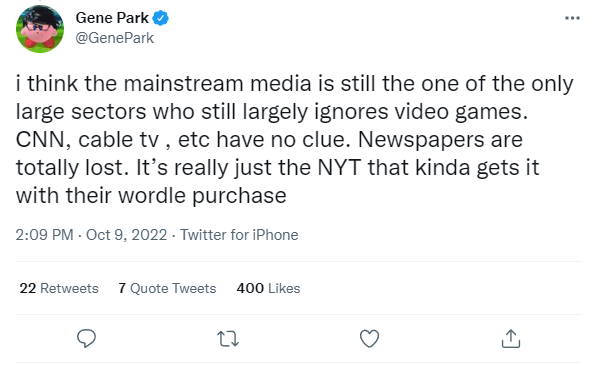Member-only story
Why Games Criticism Never Went Mainstream
It’s because games are so utterly unlike other legacy forms of culture
Recently I was reading the daily newsletter of Dan Hon — which is fantastic, and y’all ought to subscribe to it — when he linked to this tweet by Gene Park, the games reporter for the Washington Post …

It’s an excellent point. I’ve been thinking about this a lot, because I’ve been doing long-form magazine feature reporting about video games since the late 90s, and for about six years in the mid-00s I wrote video-game criticism for Slate and Wired.
Back in the 00s, most writing about video games in mainstream mass media fell into two buckets:
- Anxious op-eds about whether video games would turn the Youth of Today into wall-eyed sociopaths (if they played first-person shooters) or lazy cretins who never finished high school (if they played nearly anything else)
- Short reviews of games, highly functional and focused on whether you ought to buy it; your standard one-to-five-star rating.
There was vanishingly little critical writing about games. When I say “critical” writing, I mean “critical” not in the sense of “poking holes in something”, but in the original meaning of literary criticism: i.e. writing that tries to make sense of a particular form of culture. Why do we like it (or hate it?) How is it shaped by the aesthetics, the culture, the civic life of the day? What are the techniques of its creators? How does it reflect or comment on the human condition? Why does it sink its talons into our souls, and carry us away?
Criticism, in other words, is much more than just a one-to-five-stars review. It’s trying to figure out what a piece of culture means. When I wrote for Slate and Wired on games, I told the editors this was my hoped-for goal. I wasn’t going to write reviews. In fact I might totally ignore a huge, multimillion-dollar bestselling title if I didn’t think it did anything new or noteworthy — while, conversely, I might lavish 2,000 words one gnarly specific aspect of low-selling, not-great game, if it were usefully revealing about the form and meaning of games.
This sounds insufferably grandiose, lol. But really I was just trying to give games the same…
